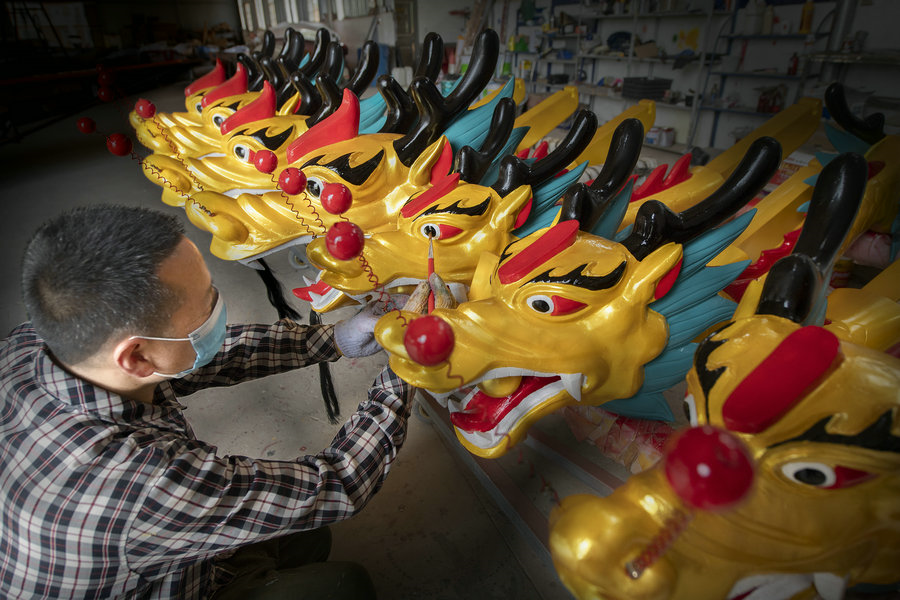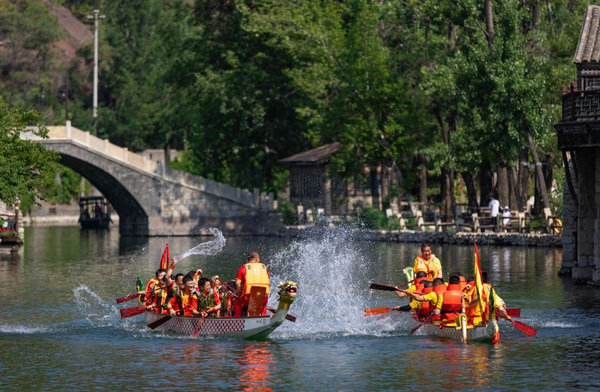Deeply rooted in ancient Chinese history and mythology, the Dragon Boat Festival (端午节), also known as Duanwu Festival, is an annual celebration that enchants both locals and visitors with its rich cultural heritage. Taking place on the fifth day of the fifth lunar month, this vibrant and exhilarating festival showcases thrilling boat races, delectable delicacies, and time-honored customs that have been passed down for over two millennia. As we delve into the fascinating world of the Dragon Boat Festival, we discover the historical significance, captivating traditions, and enduring spirit that make this celebration a cherished part of Chinese culture.
Historical significance:
The origins of the Dragon Boat Festival can be traced back to the Warring States period of ancient China, approximately 2,000 years ago. The festival pays tribute to the legendary poet and statesman Qu Yuan, who lived during the Zhou Dynasty. Qu Yuan was deeply committed to his kingdom, Chu, and sought to unify the nation against external threats. However, his loyalty and counsel were disregarded by the king, leading to his profound despair. In an act of ultimate devotion, Qu Yuan drowned himself in the Miluo River. The local people, who admired him, raced their boats to retrieve his body and threw zongzi, glutinous rice dumplings, into the river to prevent fish from consuming his remains. Thus, the Dragon Boat Festival was born, commemorating Qu Yuan’s sacrifice and expressing the community’s collective grief and admiration.
Boat races and festive spirit
The Dragon Boat Festival is synonymous with exhilarating boat races that capture the attention and enthusiasm of participants and spectators alike. These races feature long, narrow boats adorned with intricately crafted dragon heads and tails, symbolizing the mythical creatures believed to rule over bodies of water. Each boat accommodates a team of rowers, paddling in perfect synchronization to the rhythmic beat of drums and the cheering of onlookers.

The thrilling races showcase the participants’ strength, endurance, and teamwork while embodying the spirit of unity and perseverance intrinsic to Chinese culture. The atmosphere is electric, with cheers, applause, and vibrant colors creating an ambiance of excitement and camaraderie.
Traditional customs and delicacies
Alongside the boat races, the Dragon Boat Festival is steeped in age-old customs and culinary delights that add depth and flavor to the celebration. One of the most cherished customs is the preparation and consumption of zongzi, pyramid-shaped sticky rice dumplings wrapped in bamboo leaves. The fillings vary regionally, with popular options including pork, beans, nuts, dates, and even sweet versions with red bean paste. The process of making zongzi is a communal affair, involving family members and friends coming together to prepare the ingredients, wrap the dumplings, and cook them in a pot of boiling water. Sharing and savoring zongzi symbolize familial unity and harmony, and the unique flavors and textures of these delicacies tantalize the taste buds during the festival.
Another customary practice during the Dragon Boat Festival is the hanging of colorful pouches of herbs, known as “Artemisia sachets,” on doors and windows. These sachets, traditionally made with the leaves of the Artemisia plant, are believed to ward off evil spirits and protect against diseases during the summer months. The fragrant herbs inside the pouches create a pleasant aroma, infusing the air with positive energy and creating a sense of auspiciousness.

Furthermore, the festival is a time for children to receive blessings and protection. They often wear colorful silk threads around their wrists, symbolizing the wish for good health and warding off evil spirits. This tradition fosters a sense of community and warmth, as elders and family members tie these threads, known as “five-color silk threads,” on children’s wrists and exchange well wishes.
Preserving tradition in modern times
The Dragon Boat Festival has successfully withstood the test of time and remains a cherished tradition in China. While it originated as a local celebration, the festival’s significance has transcended geographical boundaries. Today, dragon boat races and festivities are organized not only in various parts of China but also in different countries around the world. These international events showcase the cultural diversity of dragon boat racing and foster cross-cultural exchange, promoting understanding and appreciation of Chinese heritage.

Moreover, the Dragon Boat Festival has also evolved to incorporate modern elements, attracting a younger generation while preserving its core traditions. Contemporary adaptations include themed dragon boat races, musical performances, cultural exhibitions, and interactive activities that engage participants of all ages. These adaptations ensure that the festival continues to thrive, serving as a bridge between the past and the present, and igniting a sense of pride and cultural identity among the Chinese people.
Testament to China’s rich cultural heritage
The Dragon Boat Festival stands as a testament to China’s rich cultural heritage, offering a window into the nation’s ancient past and the values that have endured throughout history. With its thrilling boat races, delectable zongzi, and cherished customs, the festival unites communities, fosters a sense of camaraderie, and celebrates the legacy of the revered poet Qu Yuan. As the festival continues to capture the imagination of people worldwide, it serves as a vibrant reminder of the enduring spirit, unity, and cultural diversity of the Chinese people. The Dragon Boat Festival is an extraordinary celebration that not only honors tradition but also invites all to immerse themselves in the vibrant tapestry of Chinese culture.